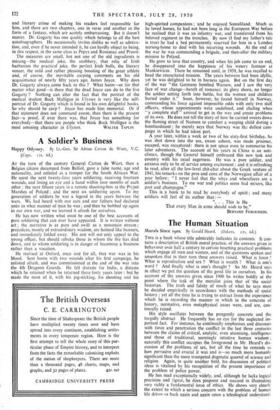A Soldier's Business
Happy Odyssey. By Lt.-Gen. Sir Adrian Carton de Wiart, V.C. (Cape. i 2s. 6d.) AT the turn of the century General Carton de Wiart, then a Belgian citizen decamped from Balliol, gave a false name, age and nationality, and enlisted as a trooper for the South African War. He spent the next twenty-four years soldiering, receiving fourteen wounds, and losing an eye and a hand within four months of each other ; the next fifteen years in a remote shooting-box in the Prypet Marshes of Poland ; and the next six soldiering again. To my generation of soldiers he was a legend in the years between the Wars. W. had heard with our ears and our fathers had declared unto us what manner of man he was ; and then he bobbed up again in our own war, and we learned it afresh for ourselves.
He has now written what must be one of the best accounts of pure soldiering that can ever have appeared. It is written without art ; the narrative is as pure and swift as a mountain stream ; prejudices, mostly of extraordinary wisdom, are hoisted like banners, and immediately folded away. His zest will not only appeal to the young officer, but should rebuke those in whom the fire has died down, and to whom soldiering is in danger of becoming a business rather than a vocation.
He realised at Oxford, once and for all, that war was in his blood. Sent home with two wounds after his first campaign, he enlisted afresh, and was commissioned at the end of the war into the 4th Dragoon Guards. He felt distaste for India, a distaste which he retained when he returned there forty years later ; but he made the most of it, with his pig-sticking, his shooting and his
high-spirited companions ; and he enjoyed Somaliland. Much as he loved horses, he had not been long in the European War before he realised that it was an infantry war, and transferred from his beloved regiment to the trenches. By now (I find my father's tale is true) he had a bed permanently reserved for him in a London nursing-home to deal with his recurring wounds. At the end of the war he was commanding a brigade, and thereafter the military mission to Poland.
He grew to love that country, and when his job came to an end, he disappeared into the happiness of his watery fastness at Mankiewicze. There he remained until, in 1939, he was recalled to head the resuscitated mission. The years between had been idyllic, yet he was delighted to be in harness again. But on the first day of the war " the Germans bombed Warsaw, and I saw the very face of war change—bereft of romance, its glory shorn, no longer the soldier setting forth into battle, but the women and children buried under it." Soon, however, he found himself in, Norway, commanding his force against impossible odds with only two staff officers, whose appointments were undefined, and chafing when " a complete staff " arrived to get in the way and create problems of its own. He does not tell the story of how he carried sweets down the flaming street of Namsos to comfort a weeping child during a bombardment ; he merely says that Norway was the. dullest cam- paign in which he had taken part.
A year later, within a week or two of his sixty-first birthday, he was shot down into the sea, swam ashore, was made prisoner, escaped, was recaptured: there is not space even to summarise his later adventures. The account of his years in China is an anti- climax, though the General himself embraced this new task and country with his usual eagerness. He was a pure soldier, and anxious only to be of service among excitement ; and it is refreshing to read, after all the low-level chit-chat about the Greek venture of 1941, his remarks on the pros and cons of the Norwegian affair of a year before: " I never feel that the whys and wherefores are a soldier's business. To me war and politics seem bad mixers, like port and champagne."
This is a book to be read by everybody of spirit ; and many soldiers will feel of its author that :— “. . . This is He That every Man in arms should wish to be."
BERNARD FERGUSSON.


































 Previous page
Previous page